Structure of the BSIM4 RF Simulation Model
The BSIM4 model consists of some major features that make it ideal for use in real high frequency simulations. It contains:
| • |
scalable gate resistance |
| • |
dedicated thermal noise model formulation |
| • |
different device layouts (multifinger devices) are taken into account |
| • |
substrate resistance network with correct connection to the main transistor through parasitic diodes |
| • |
New in BSIM4.3.0: Horseshoe substrate contacts |
While the first three effects are fully scalable, which means the influence of the device dimensions like gate length or width is already included in the model formulation, the substrate resistance effect included into BSIM4 has not included any of this information up to version 4.3.0. To specify the substrate resistance effect, only fixed values for up to 5 different resistors could have been set. However, in reality, the substrate resistance effect depends on sheet resistance of the body, number of gate fingers and width of the devices.
Due to this shortcoming, it is not possible to generate one fully scalable model card for a family of typical RF multifinger transistors. This is the reason why the BSIM4 Modeling Package includes two different approaches for generating BSIM4 RF models:
| • |
Single transistor models describe the very classic approach, where one simulation model is generated for each available test device. A design library based on such models does not enable the circuit designer to modify major device dimensions. Only available devices can be used to design circuits. A major benefit of this approach is that the accuracy of such a model may be very high because only one certain device behavior has to be fitted by the model parameters. |
| • |
Scalable transistor models cover a certain range of major device dimensions. In the case of a RF MOS transistor, these are the gate length and gate width of a single transistor finger and the number of gate fingers. These models have a structure, such that a design engineer can change the parameters to get an optimum transistor behavior for a certain application. |
In BSIM4.3.0, there is a newly introduced enhancement to modeling the substrate resistance. To take care of different geometric layouts, a so called "horseshoe" contact geometry was added (see details below inside the paragraph about Substrate contact resistance scaling).
The following two sections describe the structure of the single and the scalable model approaches. At first, the general structure of the BSIM4 RF model is shown.
Single Transistor Model
Figure 62 Schematic for the Single Transistor Model
|
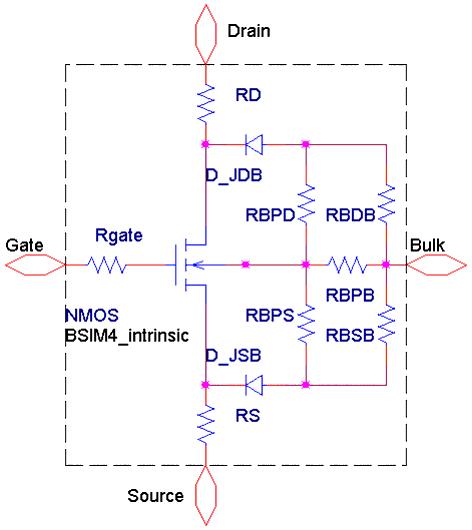
|
For the single transistor model, all substrate resistance parameters RBPB, RBPD, RBPS, RBDB, and RBSB are set to fixed values for one certain device. This is the default approach, which is supported by the BSIM4 model. The description of the model in a simulator is very easy because only the call of a model card is necessary. The following netlist in spice3e2 syntax shows an example for this model description:
.OPTIONS GMIN=1.0E-14 * *
-----------------------------------------------------------------------
* Model card for BSIM4.3.0 n-type devices | * | * Simulator: SPICE3e2 |
* Model: BSIM4 Modeling Package | * Date: 16.07.2004 | * Origin:
ICCAP_ROOT/..../bsim4/circuits/spice3/cir/nmos.cir | *
-----------------------------------------------------------------------
M1 1=D 2=G 3=S 4=B MOSMOD L=0.25u W=5u NF=1 AD=5p AS=5p PD=12u PS=12u
SA=0 SB=0 SD=0 NRD=0 NRS=0 .MODEL MOSMOD NMOS
LEVEL = 14 VERSION = 4.3.0 BINUNIT = 2 PARAMCHK = 1 + MOBMOD = 1
RDSMOD = 0 IGCMOD = 0 IGBMOD = 0 CAPMOD = 2 + RGATEMOD = 0 RBODYMOD = 0
TRNQSMOD = 0 ACNQSMOD = 0 FNOIMOD = 1 + TNOIMOD = 0 DIOMOD = 1
PERMOD = 1 GEOMOD = 0
|
Fully Scalable Device
The fully scalable model has the same structure in principal as the single transistor model, but uses additional, scalable, external inductors and capacitors. It uses equations to determine the values for the substrate resistance parameters. These equations are derived from simple assumptions according to "MOS Transistor Modeling for RF IC Design" [3]. Please see the following schematic and cross section as well as the model equations for more details.
Figure 63 Scalable BSIM4 RF model
|
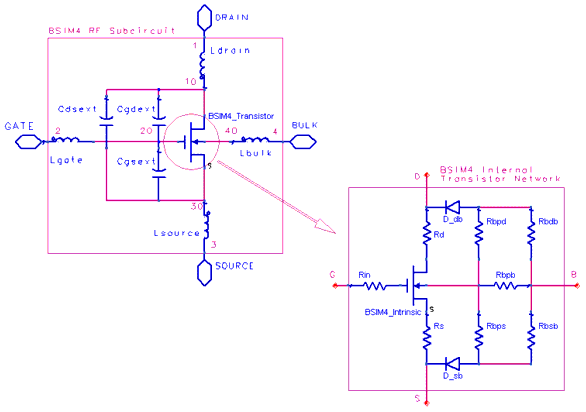
|
Figure 64 Cross Section of a Multifinger RF MOS Transistor
|
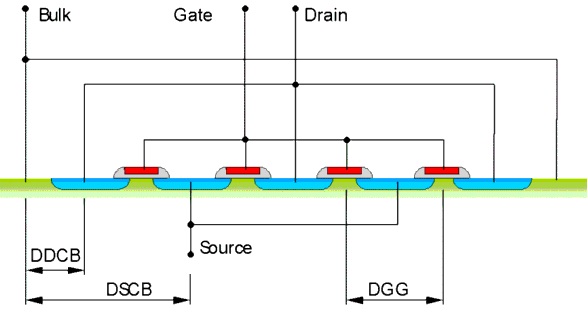
|
The substrate resistance network parameters RBPB, RBPD, RBPS, RBDB, and RBSB are derived using 4 new model parameters:
| • |
RSHB: sheet resistance of the substrate |
| • |
DSCB: distance between the source contact and the outer source area |
| • |
DDCB: distance between the drain contact and the outer drain area |
| • |
DGG: distance between two gate stripes |
Relevant Model Equations for Substrate Resistance Parameters
-

-

-

-

-

Substrate contact resistance scaling
Due to different layouts of RF multifinger MOS transistors, BSIM4.3.0 has been enhanced with a new flag to model the substrate resistance according to the substrate contacts used. The flag, RSUB_EQ, can have two values:
| |
• |
RSUB_EQ = 0 : symmetric substrate contacts |
| |
• |
RSUB_EQ = 1 : horseshoe substrate contact |
For the horseshoe contact, a new dimension has been defined, as can be seen in Figure 68:
| |
• |
DHSDBC: distance between Drain or Source edge and substrate contact of the horseshoe |
Inside the Modeling Package, temporary parameters are used to calculate the values for the five resistances used inside BSIM4. Figure 65 as well as Figure 67 are showing the use of those temporary parameters, tmp_rdb1, tmp_rdb2, tmp_rsb1 and tmp_rsb2.
The following figure shows a RF multifinger MOS transistor with symmetric substrate contacts (use RSUB_EQ = 0), whereas Figure 66 shows a 3-dimensional view of such a contact.
Figure 65 Symmetric substrate contacts, top view
|
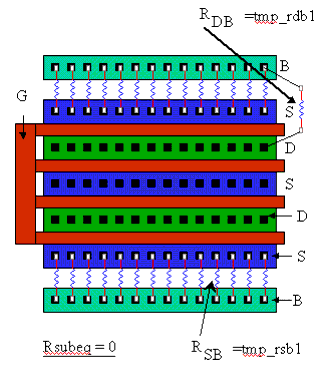
|
Figure 66 3-dimensional view of a symmetric substrate contact with Source connected to Substrate
|
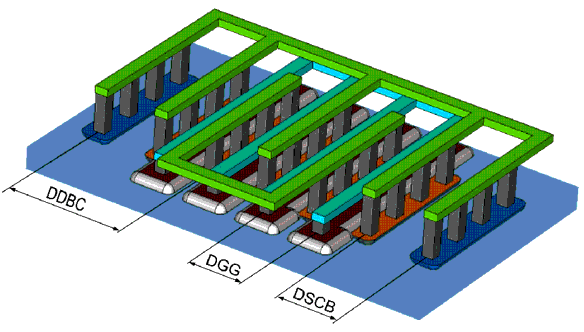
|
The following equations are used to calculate substrate resistance temporary values inside the fully scalable model:
-

-

-

-

The following figures show the horseshoe substrate contact as well as a 3-dimensional view of such a contact (use RSUB_EQ=1).
Figure 67 Horseshoe substrate contacts, top view
|

|
The temporary values calculated above are combined to give BSIM4 model parameters as follows:
RSUB_EQ = 0:


Figure 68 3-dimensional view of a horseshoe substrate contact with Source connected to Substrate
|
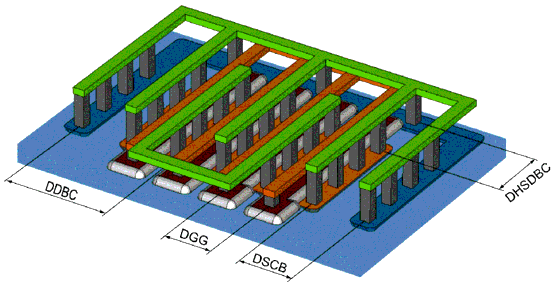
|
RSUB_EQ = 1:
-

-

In addition, the channel length variation inside a multifinger device is not constant [4]. This behavior is taken into account using a variable channel length variation as a function of the number of gate fingers. Using the parameters DL0, DL1, and DL2 this channel length variation can be set.
Channel Length Reduction Difference
Figure 69 DL0, DL1, DL2 Channel Length Reduction Difference inside a Multifinger Device
|
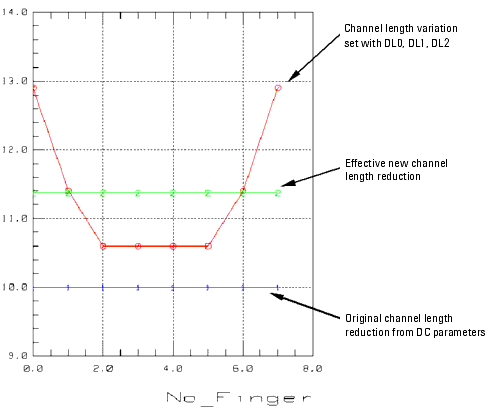
|
The implementation of these enhancements requires the fully scalable model defined in a subcircuit. The following example shows the netlist implemented into the ADS simulator.
LINK CIRC "Circuit"
{
data
{
circuitdeck
{
;
-----------------------------------------------------------------------------------------
; Fully scalable subcircuit model for BSIM4.5.0 RF n-type devices
;
; Simulator: Agilent Advanced Design System
; Model: BSIM4 Modeling Package
; Date: 09.02.2006
; Origin: ICCAP_ROOT/..../bsim4/circuits/hpeesofsim/cir/rf_nmos_scale.cir
;
-----------------------------------------------------------------------------------------
;
; --- Information for model implementation
-------------------------------------------------
; In ADS, call the sub circuit model as follows with the actual values of L, W, etc.
;
; BSIM4_RF_Extract:x_rf_transistor n1 n2 n3 n4 tmp_l= 0.25u tmp_w= 80u ....
;
; Please note, that according to the BSIM4 model definition, the parameters tmp_w, tmp_ad,
; tmp_as, tmp_pd, tmp_ps, tmp_nrs, tmp_nrd always define the TOTAL width (drain area, ...,
; number of drain squares) of the multi finger device.
; The width (drain area, ..) of a single finger of the multifinger MOSFET will be calculated
; inside the BSIM4 model using the instance parameter 'NF' and the selected 'GEOMOD'
parameter.
;
;
define bsim4_rf_extract (i1 i2 i3 i4)
;--- parameters for sub-circuit -----------------------------------------------------------
parameters tmp_l= 1u tmp_w= 10e-6 tmp_nf= 1 tmp_ad= 10e-12 tmp_as= 10e-12 tmp_pd= 22e-6
tmp_ps= 22e-6 tmp_sa= 0 tmp_sb= 0 tmp_sd= 0 tmp_nrd= 0 tmp_nrs= 0
;
;--- BSIM4 model card ---------------------------------------------------------------------
NMOS = 1 PMOS = 0 VERSION = 4.50 BINUNIT = 2 PARAMCHK = 1
MOBMOD = 1 RDSMOD = 0 IGCMOD = 0 IGBMOD = 0 CAPMOD = 2
RGATEMOD = 0 RBODYMOD = 0 TRNQSMOD = 0 ACNQSMOD = 0 FNOIMOD = 1
TNOIMOD = 0 DIOMOD = 1 PERMOD = 1 GEOMOD = 0 EPSROX = 3.9
TOXE = 3e-9 TOXP = 3e-9 TOXM = 3e-9 DTOX = 0 XJ = 1.5e-7
NDEP = 1.7e17 NGATE = 0 NSD = 1e20 XT = 1.55e-7 RSH = 0
RSHG = 0.1 VTH0 = 0.7 PHIN = 0 K1 = 0.33 K2 = -0.018
K3 = 2 K3B = 0 W0 = 2.5e-6 LPE0 = 1.74e-7 LPEB = 0
VBM = -3 DVT0 = 2.2 DVT1 = 0.53 DVT2 = -0.032 DVTP0 = 0
DVTP1 = 0.001 DVT0W = 0 DVT1W = 5.3e6 DVT2W = -0.032 ETA0 = 0.08
ETAB = -0.07 DSUB = 0.56 U0 = 0.067 UA = 1e-9 UB = 1e-19
UC = -0.0465 UD = 1e+14 UP = 0 LP = 1e-8 EU = 1.67
VSAT = 8e4 A0 = 1 AGS = 0 B0 = 0 B1 = 0
KETA = -0.047 A1 = 0 A2 = 1 VOFF = -0.08 VOFFL = 0
MINV = 0 NFACTOR = 1 CIT = 0 CDSC = 2.4e-4 CDSCB = 0
CDSCD = 0 PCLM = 1.3 PDIBLC1 = 0.39 PDIBLC2 = 0.0086 PDIBLCB = 0
DROUT = 0.56 PSCBE1 = 4.24e8 PSCBE2 = 1e-5 PVAG = 0 DELTA = 0.01
FPROUT = 0 PDITS = 1m PDITSL = 0 PDITSD = 0 RDSW = 200
RDSWMIN = 0 RDW = 100 RDWMIN = 0 RSW = 100 RSWMIN = 0
PRWG = 1 PRWB = 0 WR = 1 LINT = 0 WINT = 0
|
DWG = 0 DWB = 0 WL = 0 WLN = 1 WW = 0
WWN = 1 WWL = 0 LL = 0 LLN = 1 LW = 0
LWN = 1 LWL = 0 LLC = 0 LWC = 0 LWLC = 0
WLC = 0 WWC = 0 WWLC = 0 ALPHA0 = 1e-5 ALPHA1 = 0
BETA0 = 15 AGIDL = 0 BGIDL = 2.3e9 CGIDL = 0.5 EGIDL = 0.8
AIGBACC = 0.43 BIGBACC = 0.054 CIGBACC = 0.075 NIGBACC = 1 AIGBINV = 0.35
BIGBINV = 0.03 CIGBINV = 0.006 EIGBINV = 1.1 NIGBINV = 3 AIGC = 0.54
BIGC = 0.054 CIGC = 0.075 AIGSD = 0.43 BIGSD = 0.054 CIGSD = 0.075
DLCIG = 0 NIGC = 1 POXEDGE = 1 PIGCD = 1 NTOX = 1
TOXREF = 3e-9 XPART = 0 CGSO = 0 CGDO = 0 CGBO = 0
CGSL = 0 CGDL = 0 CKAPPAS = 0.6 CKAPPAD = 0.6 CF = 0
CLC = 1e-7 CLE = 0.6 DLC = 0 DWC = 0 VFBCV = -1
NOFF = 1 VOFFCV = 0 ACDE = 1 MOIN = 15 XRCRG1 = 12
XRCRG2 = 1 RBPB = 50 RBPD = 50 RBPS = 15 RBDB = 50
RBSB = 50 GBMIN = 1e-12 RBPS0 = 50 RBPSL = 0 RBPSW = 0
RBPSNF = 0 RBPD0 = 50 RBPDL = 0 RBPDW = 0 RBPDNF = 0
RBPBX0 = 100 RBPBXL = 0 RBPBXW = 0 RBPBXNF = 0 RBPBY0 = 100
RBPBYL = 0 RBPBYW = 0 RBPBYNF = 0 RBSBX0 = 100 RBSBY0 = 100
RBDBX0 = 100 RBDBY0 = 100 RBSDBXL = 0 RBSDBXW = 0 RBSDBXNF = 0
RBSDBYL = 0 RBSDBYW = 0 RBSDBYNF = 0 NOIA = 6.25e41 NOIB = 3.125e26
NOIC = 8.75 EM = 4.1e7 AF = 1 EF = 1 KF = 0
NTNOI = 1 TNOIA = 1.5 TNOIB = 3.5 DMCG = 0 DMCI = 0
DMDG = 0 DMCGT = 0 DWJ = 0 XGW = 0 XGL = 0
NGCON = 1 XL = 0 XW = 0 IJTHSREV = 0.1 IJTHSFWD = 0.1
XJBVS = 1 BVS = 10 JSS = 1e-4 JSWS = 0 JSWGS = 0
CJS = 5e-4 MJS = 0.5 MJSWS = 0.33 CJSWS = 5e-10 CJSWGS = 5e-10
MJSWGS = 0.33 PBS = 1 PBSWS = 1 PBSWGS = 1 IJTHDREV = 0.1
IJTHDFWD = 0.1 XJBVD = 1 BVD = 10 JSD = 1e-4 JSWD = 0
JSWGD = 0 CJD = 5e-4 MJD = 0.5 MJSWD = 0.33 CJSWD = 5e-10
CJSWGD = 5e-10 MJSWGD = 0.33 PBD = 1 PBSWD = 1 PBSWGD = 1
SAREF = 1E-6 SBREF = 1E-6 WLOD = 2E-6 KU0 = 4E-6 KVSAT = 0.2
KVTH0 = -2E-8 TKU0 = 0.0 LLODKU0 = 1.1 WLODKU0 = 1.1 LLODVTH = 1.0
WLODVTH = 1.0 LKU0 = 1E-6 WKU0 = 1E-6 PKU0 = 0.0 LKVTH0 = 1.1E-6
WKVTH0 = 1.1E-6 PKVTH0 = 0.0 STK2 = 0.0 LODK2 = 1.0 STETA0 = 0.0
LODETA0 = 1.0 LAMBDA = 0 VTL = 2e5 LC = 0 XN = 3
TEMPMOD = 0 TNOM = 27 UTE = -1.5 KT1 = -0.11 KT1L = 0
KT2 = 0.022 UA1 = 1e-9 UB1 = -1e-18 UC1 = 0.067 UD1 = 0
AT = 3.3e4 PRT = 0 TVFBSDOFF= 0 TVOFF = 0 NJS = 1
NJD = 1 XTIS = 3 XTID = 3 TPB = 0 TPBSW = 0
TPBSWG = 0 TCJ = 0 TCJSW = 0 TCJSWG = 0 JTSS = 0
JTSD = 0 JTSSWS = 0 JTSSWD = 0 JTSSWGS = 0 JTSSWGD = 0
NJTS = 20.0 NJTSSW = 20 NJTSSWG = 20 VTSS = 10 VTSD = 10
VTSSWS = 10 VTSSWD = 10 VTSSWGS = 10 VTSSWGD = 10 XTSS = 0.02
XTSD = 0.02 XTSSWS = 0.02 XTSSWD = 0.02 XTSSWGS = 0.02 XTSSWGD = 0.02
TNJTS = 0 TNJTSSW = 0 TNJTSSWG= 0 LINTNOI = 0 VFBSDOFF = 0.0
WEB = 0 WEC = 0 KVTH0WE = 0 K2WE = 0 KU0WE = 0
SCREF = 1E-6 WPEMOD = 0
;
;
model bsim4_mos BSIM4 \
NMOS = NMOS PMOS = PMOS \
Version = VERSION Binunit = BINUNIT Paramchk = PARAMCHK \
Mobmod = MOBMOD Rdsmod = RDSMOD Igcmod = IGCMOD Igbmod = IGBMOD \
Capmod = CAPMOD Rgatemod = RGATEMOD Rbodymod = RBODYMOD Trnqsmod = TRNQSMOD \
Acnqsmod = ACNQSMOD Fnoimod = FNOIMOD Tnoimod = TNOIMOD Diomod = DIOMOD \
Permod = PERMOD Geomod = GEOMOD Epsrox = EPSROX Toxe = TOXE \
Toxp = TOXP Toxm = TOXM Dtox = DTOX Xj = XJ \
Ndep = NDEP Ngate = NGATE Nsd = NSD Xt = XT \
Rsh = RSH Rshg = RSHG Vth0 = VTH0 Phin = PHIN \
K1 = K1 K2 = K2 K3 = K3 K3b = K3B \
|
W0 = W0 Lpe0 = LPE0 Lpeb = LPEB Vbm = VBM \
Dvt0 = DVT0 Dvt1 = DVT1 Dvt2 = DVT2 Dvtp0 = DVTP0 \
Dvtp1 = DVTP1 Dvt0w = DVT0W Dvt1w = DVT1W Dvt2w = DVT2W \
Eta0 = ETA0 Etab = ETAB Dsub = DSUB U0 = U0 \
Ua = UA Ub = UB Uc = UC Ud = UD \
Up = UP Lp = LP Eu = EU Vsat = VSAT \
A0 = A0 Ags = AGS B0 = B0 B1 = B1 \
Keta = KETA A1 = A1 A2 = A2 Voff = VOFF \
Voffl = VOFFL Minv = MINV Nfactor = NFACTOR Cit = CIT \
Cdsc = CDSC Cdscb = CDSCB Cdscd = CDSCD Pclm = PCLM \
Pdiblc1 = PDIBLC1 Pdiblc2 = PDIBLC2 Pdiblcb = PDIBLCB Drout = DROUT \
Pscbe1 = PSCBE1 Pscbe2 = PSCBE2 Pvag = PVAG Delta = DELTA \
Fprout = FPROUT Pdits = PDITS Pditsl = PDITSL Pditsd = PDITSD \
Rdsw = RDSW Rdswmin = RDSWMIN Rdw = RDW Rdwmin = RDWMIN \
Rsw = RSW Rswmin = RSWMIN Prwg = PRWG Prwb = PRWB \
Wr = WR Lint = LINT Wint = WINT Dwg = DWG \
Dwb = DWB Wl = WL Wln = WLN Ww = WW \
Wwn = WWN Wwl = WWL Ll = LL Lln = LLN \
Lw = LW Lwn = LWN Lwl = LWL Llc = LLC \
Lwc = LWC Lwlc = LWLC Wlc = WLC Wwc = WWC \
Wwlc = WWLC \
Alpha0 = ALPHA0 Alpha1 = ALPHA1 Beta0 = BETA0 \
Agidl = AGIDL Bgidl = BGIDL Cgidl = CGIDL Egidl = EGIDL \
Aigbacc = AIGBACC Bigbacc = BIGBACC Cigbacc = CIGBACC Nigbacc = NIGBACC \
Aigbinv = AIGBINV Bigbinv = BIGBINV Cigbinv = CIGBINV Eigbinv = EIGBINV \
Nigbinv = NIGBINV Aigc = AIGC Bigc = BIGC Cigc = CIGC \
Aigsd = AIGSD Bigsd = BIGSD Cigsd = CIGSD Dlcig = DLCIG \
Nigc = NIGC Poxedge = POXEDGE Pigcd = PIGCD Ntox = NTOX \
Toxref = TOXREF \
Xpart = XPART Cgso = CGSO Cgdo = CGDO Cgbo = CGBO \
Cgsl = CGSL Cgdl = CGDL Ckappas = CKAPPAS Ckappad = CKAPPAD \
Cf = CF Clc = CLC Cle = CLE Dlc = DLC \
Dwc = DWC Vfbcv = VFBCV Noff = NOFF Voffcv = VOFFCV \
Acde = ACDE Moin = MOIN \
Xrcrg1 = XRCRG1 Xrcrg2 = XRCRG2 Rbpb = RBPB Rbpd = RBPD \
Rbps = RBPS \
Rbdb = RBDB Rbsb = RBSB Gbmin = GBMIN \
Rbps0 = RBPS0 Rbpsl = RBPSL Rbpsw = RBPSW Rbpsnf = RBPSNF \
Rbpd0 = RBPD0 Rbpdl = RBPDL Rbpdw = RBPDW Rbpdnf = RBPDNF \
Rbpbx0 = RBPBX0 Rbpbxl = RBPBXL Rbpbxw = RBPBXW Rbpbxnf = RBPBXNF \
Rbpby0 = RBPBY0 Rbpbyl = RBPBYL Rbpbyw = RBPBYW Rbpbynf = RBPBYNF \
Rbsbx0 = RBSBX0 Rbsby0 = RBSBY0 Rbdbx0 = RBDBX0 Rbdby0 = RBDBY0 \
Rbsdbxl = RBSDBXL Rbsdbxw = RBSDBXW Rbsdbxnf = RBSDBXNF \
Rbsdbyl = RBSDBYL Rbsdbyw = RBSDBYW Rbsdbynf = RBSDBYNF \
Noia = NOIA Noib = NOIB Noic = NOIC Em = EM \
Af = AF Ef = EF Kf = KF Ntnoi = NTNOI \
Tnoia = TNOIA Tnoib = TNOIB \
Dmcg = DMCG Dmci = DMCI Dmdg = DMDG Dmcgt = DMCGT \
Dwj = DWJ Xgw = XGW Xgl = XGL Ngcon = NGCON \
Xl = XL Xw = XW \
Ijthsrev = IJTHSREV Ijthsfwd = IJTHSFWD Xjbvs = XJBVS Bvs = BVS \
Jss = JSS Jsws = JSWS Jswgs = JSWGS Cjs = CJS \
Mjs = MJS Mjsws = MJSWS Cjsws = CJSWS Cjswgs = CJSWGS \
Mjswgs = MJSWGS Pbs = PBS Pbsws = PBSWS Pbswgs = PBSWGS \
Ijthdrev = IJTHDREV Ijthdfwd = IJTHDFWD Xjbvd = XJBVD Bvd = BVD \
Jsd = JSD Jswd = JSWD Jswgd = JSWGD Cjd = CJD \
Mjd = MJD Mjswd = MJSWD Cjswd = CJSWD Cjswgd = CJSWGD \
|
Mjswgd = MJSWGD Pbd = PBD Pbswd = PBSWD Pbswgd = PBSWGD \
Saref = SAREF Sbref = SBREF Wlod = WLOD Ku0 = KU0 \
Kvsat = KVSAT Kvth0 = KVTH0 Tku0 = TKU0 Llodku0 = LLODKU0 \
Wlodku0 = WLODKU0 Llodvth = LLODVTH Wlodvth = WLODVTH Lku0 = LKU0 \
Wku0 = WKU0 Pku0 = PKU0 Lkvth0 = LKVTH0 Wkvth0 = WKVTH0 \
Pkvth0 = PKVTH0 Stk2 = STK2 Lodk2 = LODK2 Steta0 = STETA0 \
Lodeta0 = LODETA0 Lambda = LAMBDA Vtl = VTL Lc = LC \
Xn = XN \
Tempmod = TEMPMOD \
Tnom = TNOM Ute = UTE Kt1 = KT1 Kt1l = KT1L \
Kt2 = KT2 Ua1 = UA1 Ub1 = UB1 Uc1 = UC1 \
Ud1 = UD1 At = AT Prt = PRT Tvfbsdoff= TVFBSDOFF \
Tvoff = TVOFF Njs = NJS Njd = NJD Xtis = XTIS \
Xtid = XTID Tpb = TPB Tpbsw = TPBSW Tpbswg = TPBSWG \
Tcj = TCJ Tcjsw = TCJSW Tcjswg = TCJSWG Jtss = JTSS \
Jtsd = JTSD Jtssws = JTSSWS Jtsswd = JTSSWD Jtsswgs = JTSSWGS \
Jtsswgd = JTSSWGD Njts = NJTS Njtssw = NJTSSW Njtsswg = NJTSSWG \
Vtss = VTSS Vtsd = VTSD Vtssws = VTSSWS Vtsswd = VTSSWD \
Vtsswgs = VTSSWGS Vtsswgd = VTSSWGD Xtss = XTSS Xtsd = XTSD \
Xtssws = XTSSWS Xtsswd = XTSSWD Xtsswgs = XTSSWGS Xtsswgd = XTSSWGD \
Tnjts = TNJTS Tnjtssw = TNJTSSW Tnjtsswg = TNJTSSWG Lintnoi = LINTNOI \
Vfbsdoff = VFBDSDOFF Web = WEB Wec = WEC Kvth0we = KVTH0WE \
K2we = K2WE Ku0we = KU0WE Scref = SCREF Wpemod = WPEMOD
;
;
;--- Extension to BSIM4 to enable: -----------------------------------------
; - scalable external capacitors taking into account cross coupling between metal lines
and
; inductors to account for delay effects due to the size of the devices
; - scalable channel length reduction in multi finger devices
; - a scalable substrate network using different configurations (symmetric / horseshoe)
; - scalable Delta L reduction
;
CGDEXT0 = 1e-9 ; external capacitance gate - drain per gate width and gate finger [F/m]
CGSEXT0 = 1e-9 ; external capacitance gate - source per gate width and gate finger [F/m]
CDSEXT0 = 1e-9 ; external capacitance drain - source per gate width and gate finger [F/m]
LDRAIN0 = 1e-6 ; drain inductance per gate width and gate finger [H/m]
LGATE0 = 1e-6 ; gate inductance per gate width and gate finger [H/m]
LSOURCE0 = 1e-6 ; source inductance per gate width and gate finger [H/m]
LBULK0 = 1e-6 ; bulk inductance per gate width and gate finger [H/m]
RSHB = 25 ; bulk sheet resistance [Ohms sq]
DSBC = 2e-6 ; distance source implant to bulk contact [m]
DDBC = 2e-6 ; distance drain implant to bulk contact [m]
DGG = 2e-6 ; distance gate to gate [m]
DHSDBC = 2e-6 ; distance drain/source edge to horseshoe substrate contact [m]
DL0 = 0 ; basic channel length reduction correction [m]
DL1 = 0 ; channel length reduction correction 1. and 2. outer fingers [m]
DL2 = 0 ; channel length reduction correction outer fingers [m]
RSUBEQ = 0 ; selection flag for different substrate resistance configurations [-]
; RSUBEQ= 0: symmetric substrate resistance contacts
; RSUBEQ= 1: horseshoe substrate resistance contacts
;
|
;--- temporary constants
#echo factor_even_odd = 0.5*(1+(tmp_nf-2*int(0.5*tmp_nf)))
#echo tmp_dl1 = (tmp_nf-4.5)/(2*abs(tmp_nf-4.5)) * 8/ tmp_nf
#echo tmp_dl2 = (tmp_nf-2.5)/(2*abs(tmp_nf-2.5)) * 4/ tmp_nf
;--- calculation of substrate resistance for different configurations
#echo tmp_rdb1 = factor_even_odd*tmp_nf*DDBC*RSHB / tmp_w
#echo tmp_rsb1 = factor_even_odd*tmp_nf*DSBC*RSHB / tmp_w
#echo tmp_rdb2 = DHSDBC*RSHB / (tmp_nf*(DGG+tmp_l))
#echo tmp_rsb2 = tmp_rdb2
#echo tmp_rdb_rsubeq0 = tmp_rdb1 ; RSUBEQ= 0 symmetric substrate contacts
#echo tmp_rsb_rsubeq0 = tmp_rsb1
#echo tmp_rdb_rsubeq1 = (tmp_rdb1*tmp_rdb2)/(tmp_rdb1+tmp_rdb2) ; RSUBEQ= 1 horseshoe
#echo tmp_rsb_rsubeq1 = (tmp_rsb1*tmp_rsb2)/(tmp_rsb1+tmp_rsb2) ; substrate contacts
#echo tmp_flag_rsubeq0 = 1/(1+abs(RSUBEQ)*1e9) ; flag to select substrate equations
#echo tmp_flag_rsubeq1 = 1/(1+abs(RSUBEQ-1)*1e9)
#echo tmp_rbdb = tmp_flag_rsubeq0*tmp_rdb_rsubeq0 + tmp_flag_rsubeq1*tmp_rdb_rsubeq1
#echo tmp_rbsb = tmp_flag_rsubeq0*tmp_rsb_rsubeq0 + tmp_flag_rsubeq1*tmp_rsb_rsubeq1
;
; --------- Gate network ------------------------------
C:Cgdext n20 n10 C= CGDEXT0*tmp_w
C:Cgsext n20 n30 C= CGSEXT0*tmp_w
L:Lgate i2 n20 L= LGATE0*tmp_w
;
; --------- Drain network -----------------------------
C:Cdsext n10 n30 C= CDSEXT0*tmp_w
L:Ldrain i1 n10 L= LDRAIN0*tmp_w
;
; --------- Source network -----------------------------
L:Lsource i3 n30 L= LSOURCE0*tmp_w
;
; --------- Substrate network -------------------------
L:Lbulk i4 n40 L= LBULK0*tmp_w
;
;--- call fully scalable MOSFET -----------------------------------------------------------
#echo bsim4_mos:M1 n10 n20 n30 n40 \
#echo Length= tmp_l - 2*(DL0+tmp_dl1*DL1+tmp_dl2*DL2) \
#echo Width= tmp_w Nf= tmp_nf Ad= tmp_ad As= tmp_as Pd= tmp_pd Ps= tmp_ps \
#echo Sa= tmp_sa Sb= tmp_sb Sd= tmp_sd \
#echo Nrd= tmp_nrd Nrs= tmp_nrs \
#echo Rbpb= 1e9 \
#echo Rbps= 0.5*RSHB*(tmp_l+DGG) / tmp_w \
#echo Rbpd= 0.5*RSHB*(tmp_l+DGG) / tmp_w \
#echo Rbsb= tmp_rbsb \
#echo Rbdb= tmp_rbdb
;
end BSIM4_RF_Extract
}
}
}
|
|







